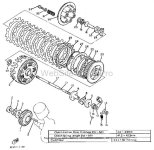You are using an out of date browser. It may not display this or other websites correctly.
You should upgrade or use an alternative browser.
You should upgrade or use an alternative browser.
Clutch: Wet vs. Dry
- Thread starter Beavis
- Start date
/ Clutch: Wet vs. Dry
#1
dave1949
Super Star Member
Good question. I'd appreciate hearing of experiences/opinions on this too.
Dave.
Dave.
RickB
Super Star Member
- Joined
- Sep 18, 2000
- Messages
- 15,205
- Location
- Up the road from Dollar General WNC
- Tractor
- Just a Scag
A dry clutch is just that, a clutch that lives and works in a dry environment. Usually, but not always a single disc between two pressure plates or one pressure plate and the flywheel. Usually, but not always mechanically controlled, a dry clutch can sometimes be hydraulically controlled. Dry clutches are cheaper to build, cheaper to replace, and generally do not last as long as wet clutches.
A wet clutch is a clutch or clutch pack that lives and works in an oil bath. Usually, but not always a stack of alternating lined and unlined discs with alternating internal and external splines within a drum and having a shaft extending through the assembly. The shaft and drum are the drive and driven elements, one way or the other. Usually, but not always hydraulically controlled by an oil filled piston that compresses the discs directly, or a hydraulic piston that controls pressure plate fingers. Wet clutches are more expensive to build considering the control circuits and clutch together and usually more expensive to repair or replace than dry clutches. Wet clutches will outlast dry clutches in like operating conditions by a wide, wide margin. This longevity and the ability to marry wet clutches with computer controlled modulation and engagement adds to their popularity and use.
A wet clutch is a clutch or clutch pack that lives and works in an oil bath. Usually, but not always a stack of alternating lined and unlined discs with alternating internal and external splines within a drum and having a shaft extending through the assembly. The shaft and drum are the drive and driven elements, one way or the other. Usually, but not always hydraulically controlled by an oil filled piston that compresses the discs directly, or a hydraulic piston that controls pressure plate fingers. Wet clutches are more expensive to build considering the control circuits and clutch together and usually more expensive to repair or replace than dry clutches. Wet clutches will outlast dry clutches in like operating conditions by a wide, wide margin. This longevity and the ability to marry wet clutches with computer controlled modulation and engagement adds to their popularity and use.
Slacker
Gold Member
Just to add to the wet clutch discussion, they require oil with no friction modifiers.
Most motorcycles and atv's have wet clutches and require motorcycle oil.
Normal oil has an additive that's no good for wet clutches.
Most motorcycles and atv's have wet clutches and require motorcycle oil.
Normal oil has an additive that's no good for wet clutches.
oldnslo
Super Member
Just to add to the wet clutch discussion, they require oil with no friction modifiers.
Most motorcycles and atv's have wet clutches and require motorcycle oil.
Normal oil has an additive that's no good for wet clutches.
Would you please explain this. Are you talking synthetic oils or oil additives like STP?
mostly_gas
Super Member
Would you please explain this. Are you talking synthetic oils or oil additives like STP?
I had a 1000cc Kawasaki for 46,000 miles and it had a wet clutch. I ran the same 19w-40 oil that cars used for the first 30,000 then switched to Amsoil 10w-40. Same clutch in it when I sold it as when I bought it.
RoyJackson
Rest in Peace
- Joined
- Nov 17, 2001
- Messages
- 24,890
- Location
- Bethel, Vermont
- Tractor
- John Deere 4052R Cab,, Deere 855D UTV, Z920A Zero Turn Mower and assorted implements
RickB wrote a great description of wet and dry clutches...thank you very much!
I think some posters may be confusing wet clutches with hydraulic assists (hydraulic slave cylinders to aid clutch actuation).
I think some posters may be confusing wet clutches with hydraulic assists (hydraulic slave cylinders to aid clutch actuation).
radman1
Elite Member
- Joined
- Jul 8, 2006
- Messages
- 3,017
- Location
- midwest
- Tractor
- JD 4520, Toolcat 5610, Bobcat S300, Case-IH 125 Pro, Case-IH 245, IH 1086, IH 806
Because the wet clutch is in an oil bath and the nature of engagement, it stays cooler during frequent shifts which causes excessive clutch heating. If you use a FEL heavily, start and stop mowing ect, then the wet clutch will last much longer. My dry clutch in my JD 5300 lasted until around 2000 hours. About $1500 to replace by mechanic. I did not use the clutch hard or lots of FEL work. However, I bought it used at 900 hours from a landscaper and the clutch was probably used much harder by the prior owner. A wet clutch may never require replacement.
Sweden-Art
Bronze Member
The advantage with a wet clutch is that you get a smoother engagement/ performance and longer life before wear out, a correct designed clutch pack and SW design with minimum slippage should outlast the machine life time easy.
A disadvantage with a wet clutch is what we call drag, and the energy losses you get from heating the oil. Drag is best explained as "you are running in water"
I would choose the wet clutch machine with no hesitations.
A disadvantage with a wet clutch is what we call drag, and the energy losses you get from heating the oil. Drag is best explained as "you are running in water"
I would choose the wet clutch machine with no hesitations.
